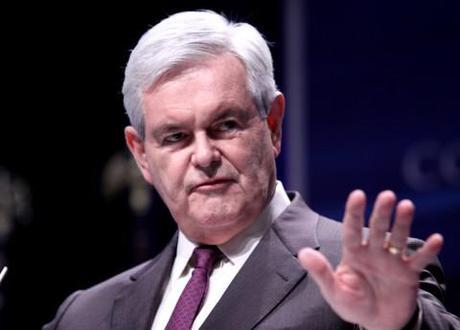
Newt Gingrich: On the attack. Photo credit: Gage Skidmore
Republican presidential frontrunner Mitt Romney came under heavy fire from his rivals during the Fox News debate ahead of the South Carolina primary. The former governor of Massachusetts faced tough questions over negative campaigning and his failure to release his tax returns.
But commentators are divided over how much damage Romney really sustained. Some argued that that the frontrunner was rattled by the attacks, while others believed he had shrugged off criticism.
All eyes are now on the South Carolina primary: with Romney having won the contests in Iowa and New Hampshire and currently enjoying an eight-point lead in the polls, the next primary may prove key for opponents Rick Santorum, Newt Gingrich, Ron Paul and Rick Perry. Well, perhaps not so much Perry, who is trailing in the polls.
Ewan MacAskill wrote in The Guardian that South Carolina is “possibly the last state in which Romney’s main opponents can feasibly stop his run for the Republican nomination”. So with all to play for, who were the winners and losers of the latest debate?
Newt Gingrich won, Romney lost. “[Romney's] uncomfortable performance watched by millions of viewers, many of them from South Carolina, may have cost him votes,” said The Guardian’s MacAskill, arguing that former House Speaker Gingrich was the real winner of the night. According to MacAskill, Gingrich and social conservative Santorum succeeding in making Romney look “hesitant, uncertain, irritated and overly defensive”, particularly over the issue of attack ads and super PACs.
Utah’s Jon Huntsman quit the GOP race and endorsed Mitt Romney. In his withdrawal speech, Huntsman criticised negative campaigning: “This race has degenerated into an onslaught of negative and personal attacks not worthy of our people,” he said, reported The Financial Times.
Tag team. “Mr. Perry, former House Speaker Newt Gingrich and former Pennsylvania Sen. Rick Santorum took turns whacking the front-runner,” said The Wall Street Journal, pointing out that Romney’s rivals managed to open “new lines of attack” during the debate. According to the WSJ, Gingrich and pals were careful not to spend too much time questioning Romney’s record at private equity firm Bain Capital, as the last time they used this attack, “other Republicans rallied around to rebuff what they saw as an attack on free-market capitalism”.
Easy ride for Romney. Jonathan Bernstein agreed at The Washington Post’s Plum Line blog that the other candidates rallied successfully against Romney – but only for about 15 minutes: “And then Fox News went to commercial, and Newt Gingrich, Rick Santorum, Ron Paul and Rick Perry turned back into pumpkins,” Bernstein said. Texas governor Perry actually did well in the debate, conceded Bernstein, but his performance comes too late in the game. All in all, Romney is still on top: “There was nothing to slow Romney’s march to a comfortable win on Saturday in South Carolina — and with it a lock on the nomination,” wrote Bernstein.
“Rick Perry ran a poor campaign but seems like the guy you’d most want to have a beer with,” wrote David Brooks in The New York Times.
Romney unscathed. Howard Kurtz argued at The Daily Beast that Romney “survived Monday night in Myrtle Beach with barely a scratch—and his rivals had forfeited another chance to derail his seemingly inevitable march to the GOP nomination”. Kurtz conceded that the former Massachusetts governor was momentarily thrown off course when Santorum confronted him over inaccurate attack ads from a Romney-supporting super PAC. “But with South Carolina voting in five days, nothing happened on that stage that would derail Romney from winning—after which there wouldn’t be much need for more debates,” wrote Kurtz.
Ron Paul lost. Texas congressman Paul took a “drubbing” in the debate, according to Reid J. Epstein at Politico. In response to a question about whether the killing of Osama bin Laden was legitimate, Paul argued that terrorist leaders should be captured rather than executed – drawing a scornful response from his rivals. Epstein was not confident that Paul’s foreign policy stance would play well in the next primary: “There are questions about whether the dovish lawmaker — who wants all U.S. troops returned from foreign entanglements and won’t confront Iran over nuclear weapons — can actually compete in a serious way in hawkish South Carolina.”

